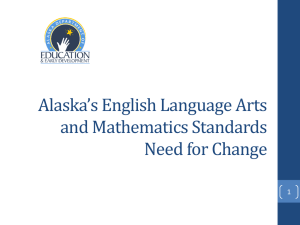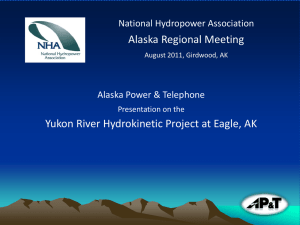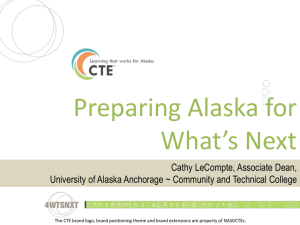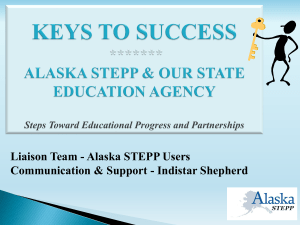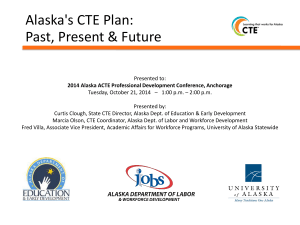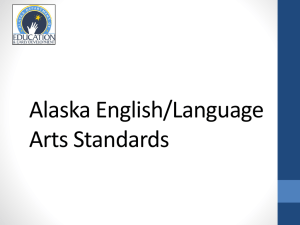AK Standards for CTE Partners
advertisement
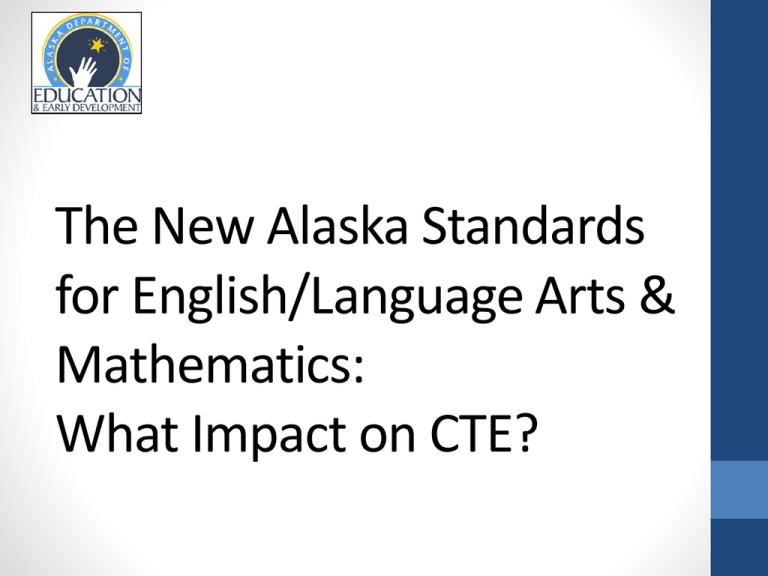
The New Alaska Standards for English/Language Arts & Mathematics: What Impact on CTE? Session Overview Purpose and Shifts of New Standards Overview of Alaska English/Language Arts and Mathematics Standards Timeline Impact for Implementation on CTE Programs History of Alaskan Standards • 1990s: Alaska standards in reading, writing, and mathematics were developed by age spans (K-2, 3-5, 6-8, and 9-12) • 2004: Grade Level Expectations (GLEs) in reading, writing, and mathematics were developed to define standards at each grade level (grades 3 – 10); assessments developed • 2006: Grade Level Expectations were expanded to include kindergarten through second grade What do we know about Alaska’s Current Grade Level Expectations (GLE’s)? February - March 2011, Alaskan educators reviewed Alaska’s Grade Level Expectations (GLEs) and the proposed “common core” national standards. We know: 1. the GLEs are low in rigor. 2. the GLEs are over six years old. 3. the GLEs do not extend beyond grade 10. 4. the GLEs are broad and open to teacher interpretation. 5. the GLEs are a blueprint for assessment. NAEP – Reading Grade 8 NAEP - Mathematics Grade 8 International Competitiveness • The Program for International Student Assessment (PISA) is an international study which began in the year 2000. • PISA aims to evaluate education systems worldwide by testing the skills and knowledge of 15-year-old students in participating countries/economies. • Since the year 2000 over 70 countries and economies have participated in PISA. Armed Forces Qualification Test (AFQT) General Cognitive Ability Subtests of ASVAB Alaska‘s New English Language Arts (ELA) & Mathematics Standards • Aligned with college and career expectations. • Include rigorous content and application of knowledge through higher-order skills • Consistent learning goals for all students, regardless of where they live. Note: The Alaska Standards are equal in rigor to the national Common Core State Standards. Shifts in English Language Arts 1. Building knowledge through content-rich nonfiction and informational texts in addition to literature. 2. Reading and writing grounded in evidence from the text. 3. Regular practice with complex text and its academic vocabulary. Shifts in Mathematics 1. Focus: 2-3 topics focused on deeply in each grade. 2. Coherence: Concepts logically connected from one grade to the next and linked to other major topics within the grade. 3. Rigor: Fluency with arithmetic, application of knowledge to real-world situations, and deep understanding of mathematical concepts. Standards for Literacy in History/Social Studies, Science, and Technical Subjects do not address the technical content students must master READING WRITING 10 Anchor Standards 10 Anchor Standards Arranged in 4 strands Arranged in 4 Strands Key Ideas and Details Craft and Structure Integration of Knowledge and Ideas Range of Reading and Level of Text Complexity Text Types and Purpose Production and Distribution of Writing Research to Build and Present Knowledge Range of Writing Grade Specific Standard Grade Specific Standards 6-8 9-10 11-12 6-8 9-10 11-12 Standards for Literacy in History/Social Studies, Science, and Technical Subjects 6-12 Foundational Skills in the Early Grades • The instruction of the basic reading components is still an expectation • The standards for these skill are found in grades K-5 Math Organization Two areas of equal importance • Standards for Mathematical Practice • Standards for Mathematical Content Math Organization The Standards for Mathematical Practice are embedded at every grade level to establish habits of mind that will empower students to become mathematically literate. The Standards of Mathematical Practice include the Math Process Standards • Problem Solving • Communication • Reasoning • Connections Modeling encourages students to use mathematics in the context of real-world applications. Math Organization Roll-out Phases http://education.alaska.gov/ PDF of New Alaska ELA & Math Standards Toolkit of Resources Alaska’s Standards Toolkit Professional Development Opportunities Webinars https://www.acteonline.org/uploadedFiles/Publications_and_Online_Media/files/Career_Readiness_Paper_COLOR.pdf What does this mean for CTE? • Students need mastery of ELA and math standards to excel in CTE programs. • CTE programs help students develop transferable strategies to apply and practice use of ELA and math knowledge and skills through multiple strategies, e.g. integrated, infused, imbedded, reinforced content. • CTE needs to insure our instructional strategies help students understand ELA and math standards, e.g. translate terminology. CTE Curriculum Alignment Resources for CTE https://www.acteonline.org/issuebriefs.aspx, http://www.careertech.org/resources/information.html Alaska Standards Timeline SY 2012-13 • Awareness Campaign • Transition Tools • Field test new assessment items June 2012 • Adoption by State board SY 2014-15 • Continue with curriculum alignment and implementation SY 2013-14 • Alignment of curriculum to new standards • Begin implementation of new standards SY 2015-16 • All grades and content taught to new standards • Spring ‘16 new assessment in place Spring 2016 New Alaska Assessments Field Testing New Items This Spring • New question types • Will NOT count towards students’ scores Contact Those in the Know! Karen Melin, Language Arts Content Specialist karen.melin@alaska.gov, 907-465-6536 Cecilia Miller, Mathematics Content Specialist cecilia.miller@alaska.gov, 907-465-8703 Bjorn Wolter, Science Content Specialist bjorn.wolter@alaska.gov, 907-465-6542 Elizabeth Davis, Assessment Administrator elizabeth.davis@alaska.gov, 907-465-8431
